
Over the past 200 years, the fields of psychology, psychiatry, and mental health have advanced considerably. From the earliest attempts at understanding how the human mind works to modern discoveries of effective treatments for a variety of mental health conditions, science has continually developed new and more detailed ways of conceptualizing afflictions of the mind. And as this understanding has changed, so has the way we talk about mental health and related subjects. What does that change look like – how have the words and phrases associated with mental and behavioral health evolved over the decades?
The Corpus of Historical American English (COHA) compiled by Brigham Young University contains 400 million words, compiled from 115,000 selected text sources spanning from 1810 to 2009. We searched COHA for 21 common words related to mental health – such as anxiety, therapy, and phobia – and charted their frequency in COHA since 1810.
We also gathered the surrounding context for each term by collecting 10 words before and after each occurrence. To identify the top 10 words used in proximity (the “most characteristic” in the graphs below), we identified the words appearing most in the surrounding context that were not common prepositions, pronouns, and conjunctions. Take a look at our findings, with these terms highlighted in italics, to see how the words we associate with mental and behavioral health have changed throughout history.
1. Anxiety
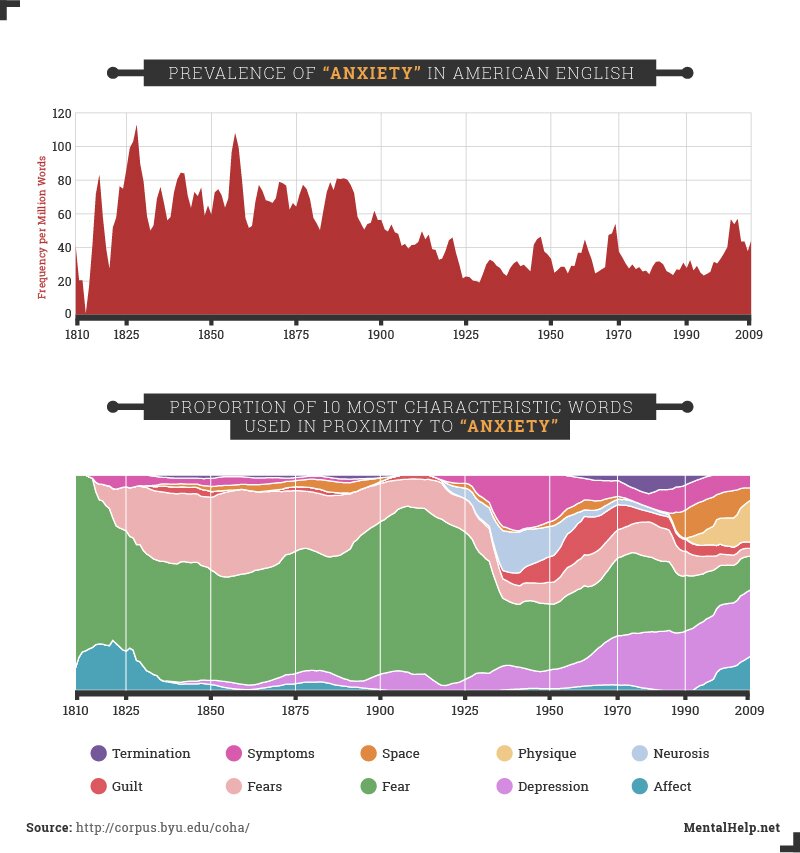
Therapists are Standing By to Treat Your Depression, Anxiety or Other Mental Health Needs
Explore Your Options Today
Ad
Anxiety was a somewhat more common term in the 19th century than the 20th century, as it was a more general synonym for fear or fears. In the last half of the century, people began to use it alongside depression; later in the 1920s, it became more limited to a clinical context where it was associated with symptoms, neurosis, and guilt.
In the 1970s, clinicians used the term “social physique anxiety” to describe body self-consciousness, and the phrase “termination of anxiety” was briefly in vogue. The combination of science fiction in outer space settings, as well as referring to areas as a “safe space,” caused that word to become associated with anxiety.
Finally, the word affect appears both very early and very late in the corpus, as the meaning of the word has changed significantly over the centuries. In the early 1800s, a person would affect anxiety if he or she showed nervousness, but since the 1990s, anxiety has been used alongside the clinical noun affect (with emphasis on the first syllable) to describe an emotional state.
2. Behavioral
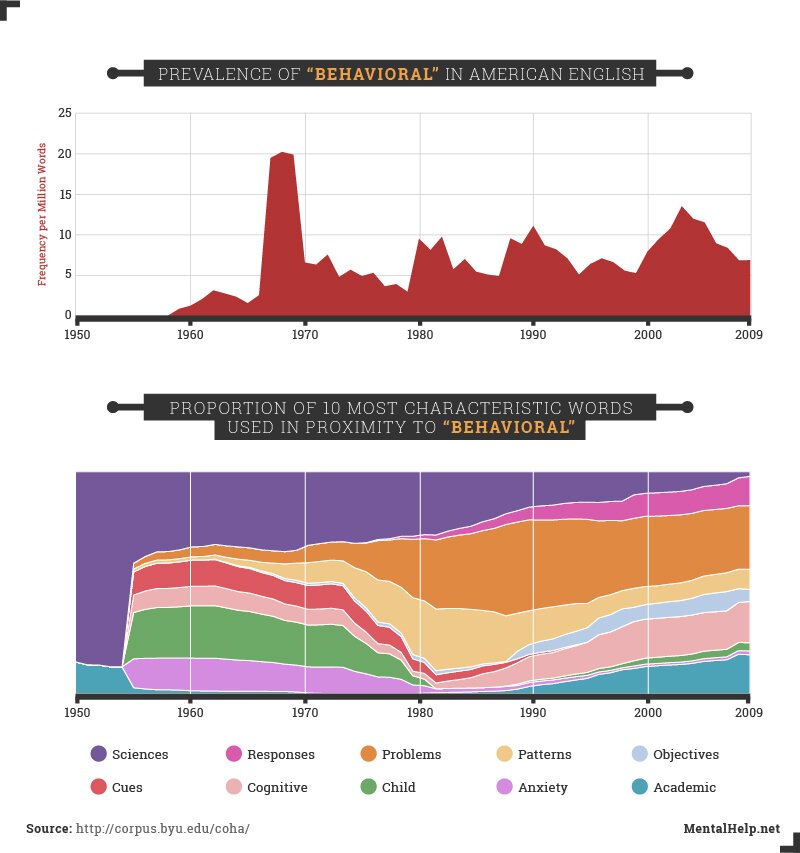
While the word behavior is commonly used in a general sense, its adjective form behavioral typically inhabits a more academic realm, used in reference to the behavioral sciences. Unsurprisingly, words associated with behavioral reflect this specific, more scholarly use. It serves as a modifier in the cases of behavioral cues, objectives, patterns, problems, and responses and is widely used in child psychology and alongside the term anxiety. It’s also part of the modern phrase cognitive-behavioral therapy – a usage that began in the 1980s.
3. Bipolar
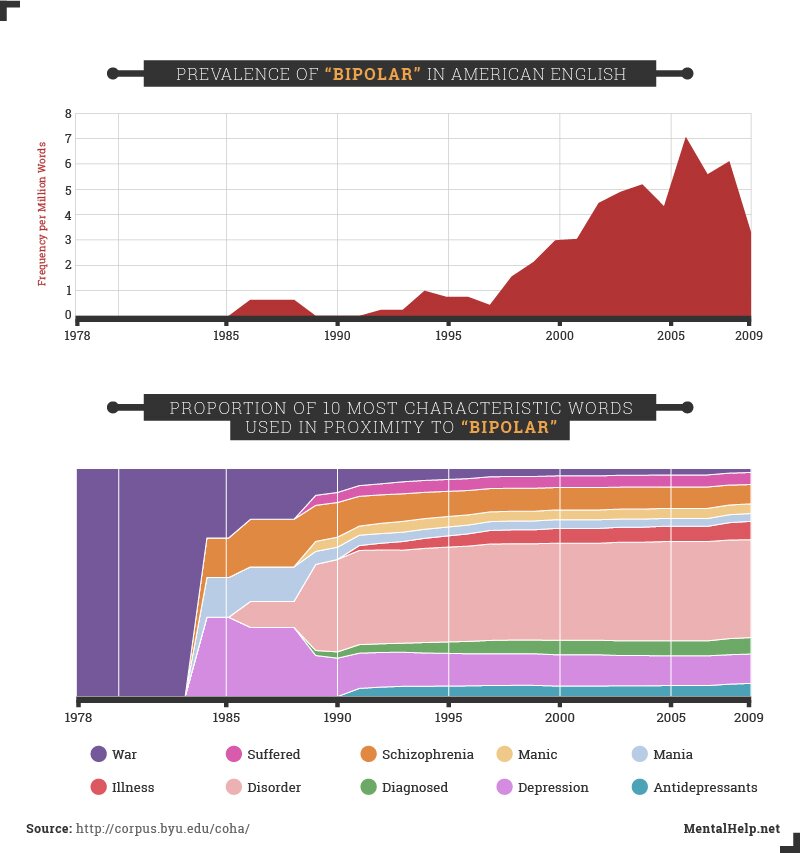
Bipolar was an uncommon and technical term at first, predictably used in a generic sense to refer to things with two poles. Its first entries in COHA refer to the Cold War as a bipolar conflict, the two poles being the U.S. and the U.S.S.R. It again entered the lexicon as it began to supplant a previous term, manic depression. From then on, it became associated with even more health-related terms, as people who suffered from mania due to this disorder or illness (which, in some cases, can share some of the psychotic symptoms of schizophrenia) were diagnosed and prescribed antidepressants.
4. Crazy
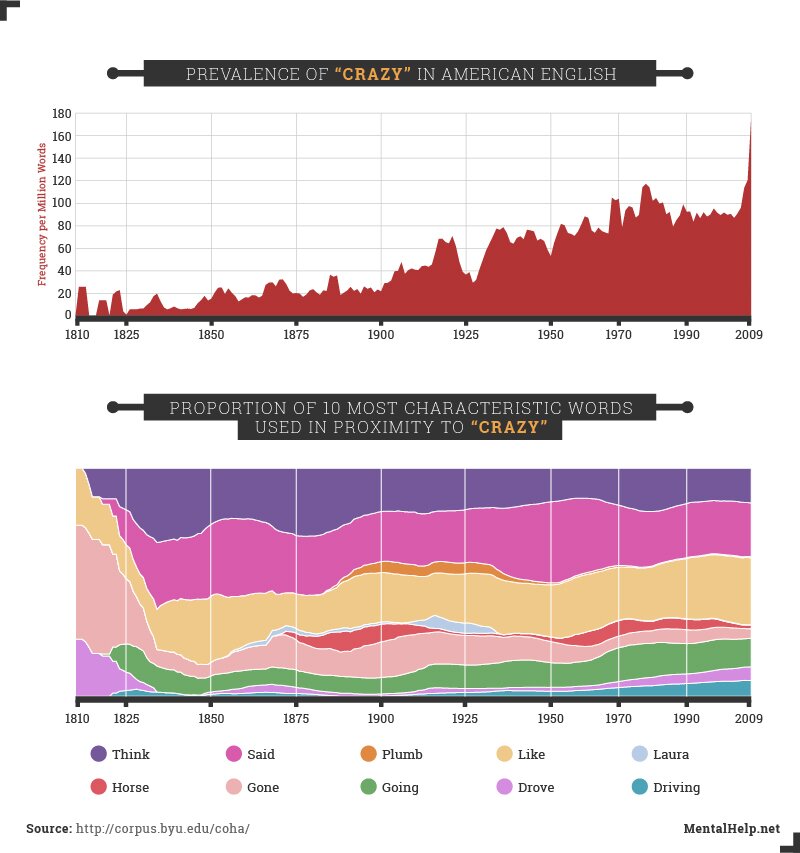
Unlike many of the terms on this list, crazy remains a general term that isn’t limited to the field of mental health, although its meaning certainly overlaps significantly with mental health in common usage. This is why the streams in the lower graph above are relatively smooth and constant, with subtle changes happening slowly over time. Many of the terms used with it remain the same as those from 200 years ago, such as the following phrases: driving or drove one crazy, going or gone crazy, plumb crazy (around the turn of the 20th century), and crazy like (a fox, for instance). The Lakota war leader Crazy Horse also begins to appear immediately before the battle of Little Bighorn in 1876. Finally, the two most popular words associated with crazy show that writers were well aware of how judgmental the term can be: Authors often used phrases similar to “I think he’s crazy” or “He said she was crazy.”
5. Depression
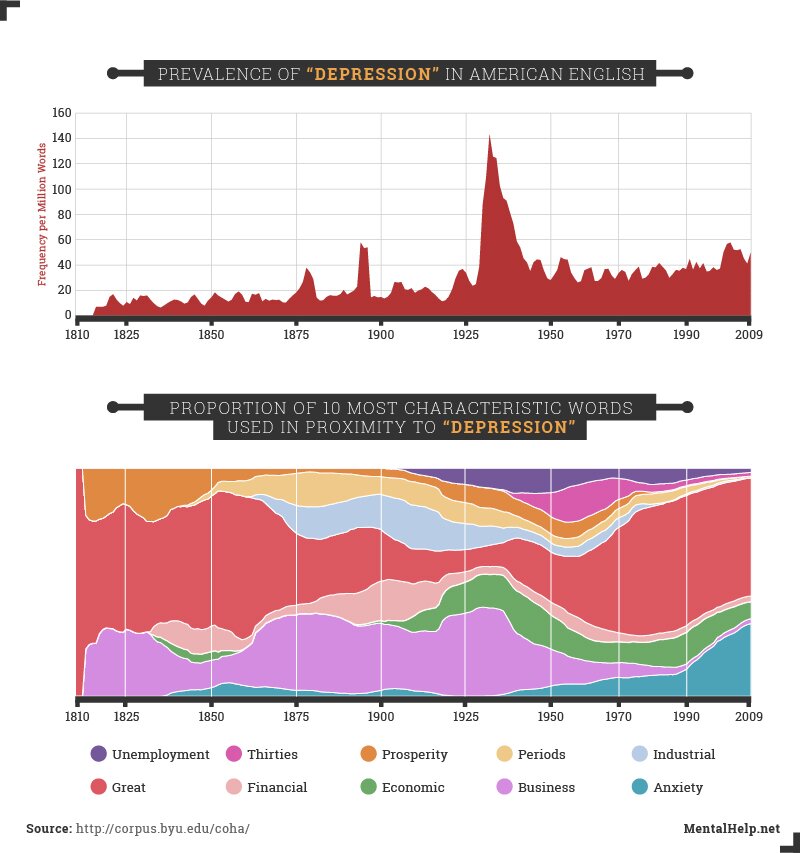
Unsurprisingly, use of the term depression soared during the Great Depression of the 19[thirties]. This was one of the most extreme of many periods where financial, industrial, business, and economic prosperity suffered. Exclusive use of the term in a mental health context, along with the associated word anxiety, really picked up in the last half of the 20th century.
6. Emotion
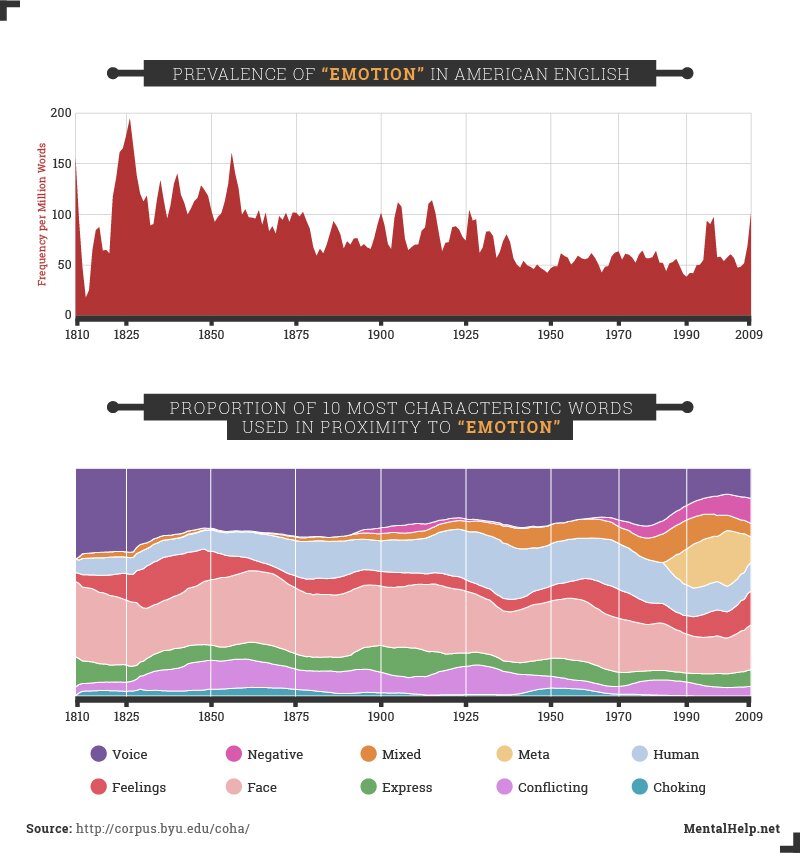
Emotion is another word with remarkably consistent associated terms – the only dramatic change is the addition of the concept meta-emotion (meaning emotion about emotion) in the 1980s. Other than that, throughout the last 200 years people have been choking on their feelings or trying to express conflicting, mixed, or negative human emotion on their face[s] or in their voice[s].
7. Hysteria
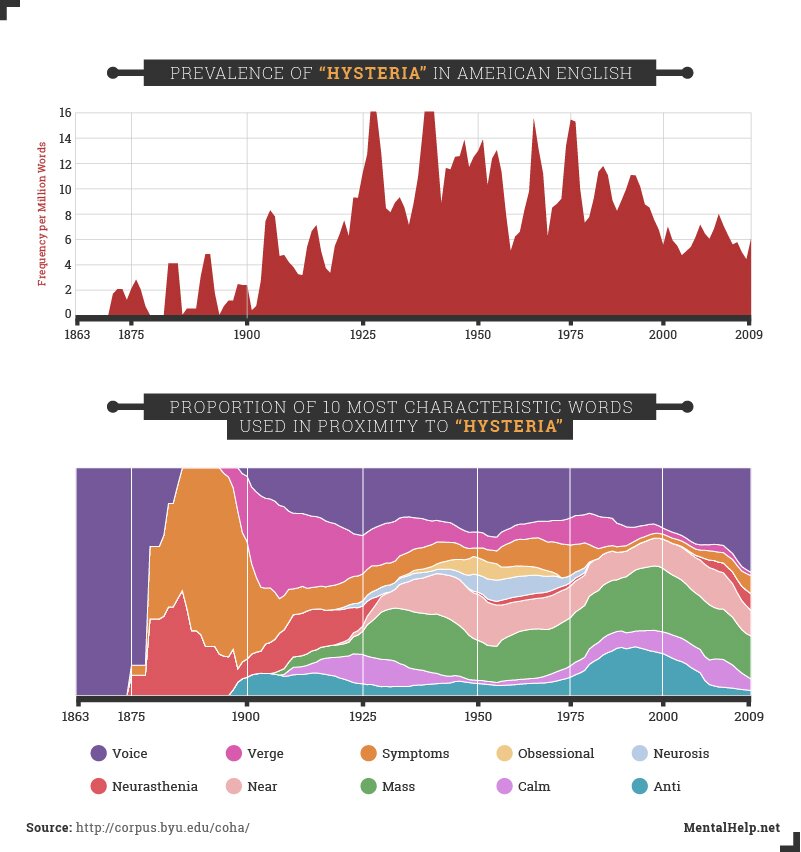
Voice was the first word associated with hysteria in COHA; fiction authors used it to describe characters. It’s interesting that neurasthenia should appear in this corpus for the term; George Miller Beard popularized it in the late 1860s to describe a nervous disorder, and it was soon after claimed by William James to be experienced by Americans more than other nationalities. James went so far as to call it “Americanitis.”
The term more or less died out during the first quarter of the 20th century, although the World Health Organization (WHO) still recognizes it. As hysteria began to be regarded as a disorder, its symptoms were explained, and fiction writers became a bit more nuanced, describing characters as on the verge of hysteria or near hysteria. The use of hysteria to describe a collective reaction instead of an individual condition gave rise to terms such as mass hysteria and anti-(communist, immigrant, war, etc.) hysteria as well as ways to calm these phenomena. Around the 1950s, describing hysteria as an obsessional neurosis came into vogue, but it disappeared by the 1970s.
One notable absence from the top 10 is female, as in female hysteria. While we might expect hysteria to be closely associated with this outdated and vague diagnosis commonly applied to women in centuries past, the phrase female hysteria only became prominent starting in the 1980s, used by authors to describe this archaic notion in a historical context.
8. Insane
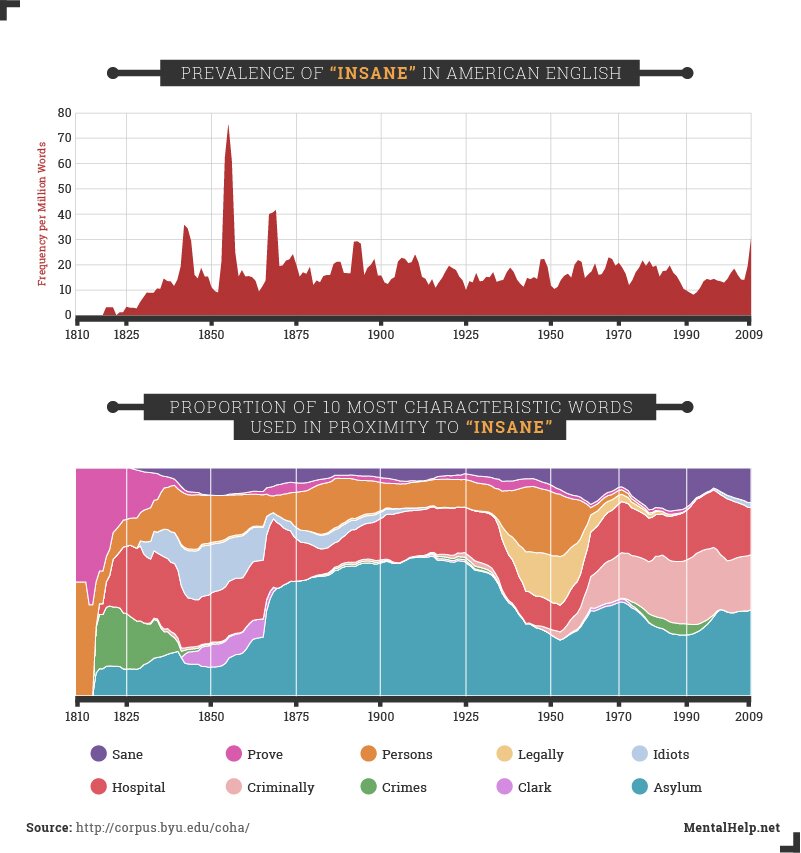
While insane may be a term related to mental health, its use has usually been specific to the field of law. This has typically involved questions of whether a lawyer could prove whether persons accused of crimes were legally insane and thus should be sent to an insane asylum or hospital for the insane or sane and thus criminally responsible for their actions. Clark appears on the list because, in the mid-19th century, a Mr. Willard Clark used an insanity defense in a highly publicized trial for the murder of his ex-fiancée’s husband. The term idiots appears because it was once a legal term used to describe someone of reduced legal culpability, such as those with developmental disorders.
9. Madness
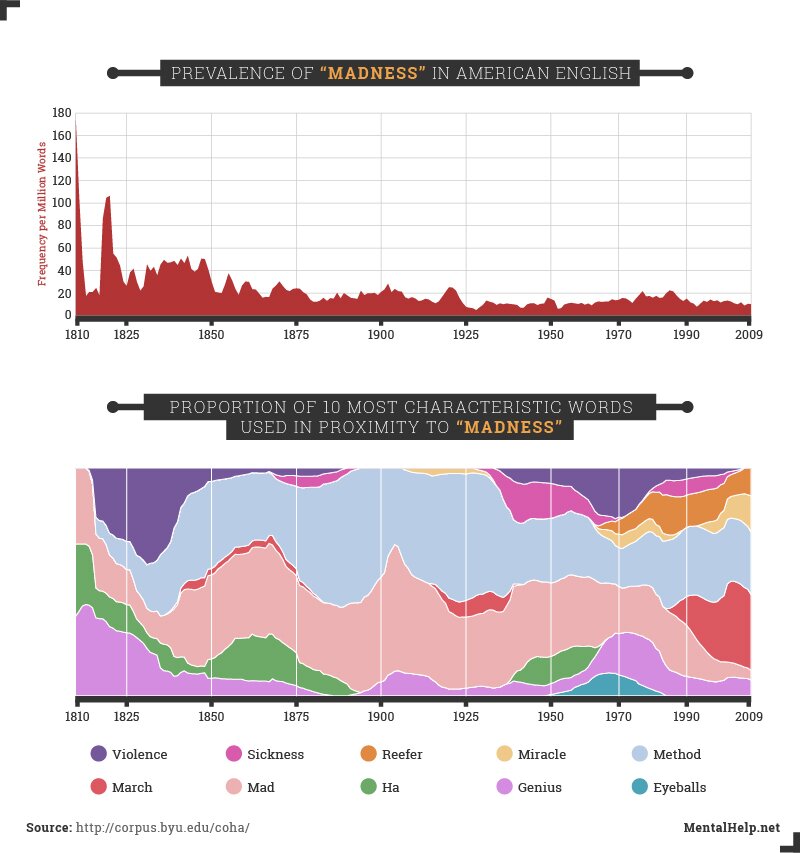
While madness can be used to describe mental health, it’s typically been used in a general sense and more frequently utilized in fiction than non-fiction. Writers have speculated about potential links between genius and madness and lamented the madness of violence. In certain books, villains are portrayed as mad, rolling their eyeballs and shouting ha! Meanwhile, witnesses to miracles wonder if their visions are the result of a sickness.
More recently, the 1950s added reefer madness to the lexicon as a way to describe marijuana use by youth, and in the last few decades, the NCAA college basketball championship has helped coin the term March Madness.
10. Mental
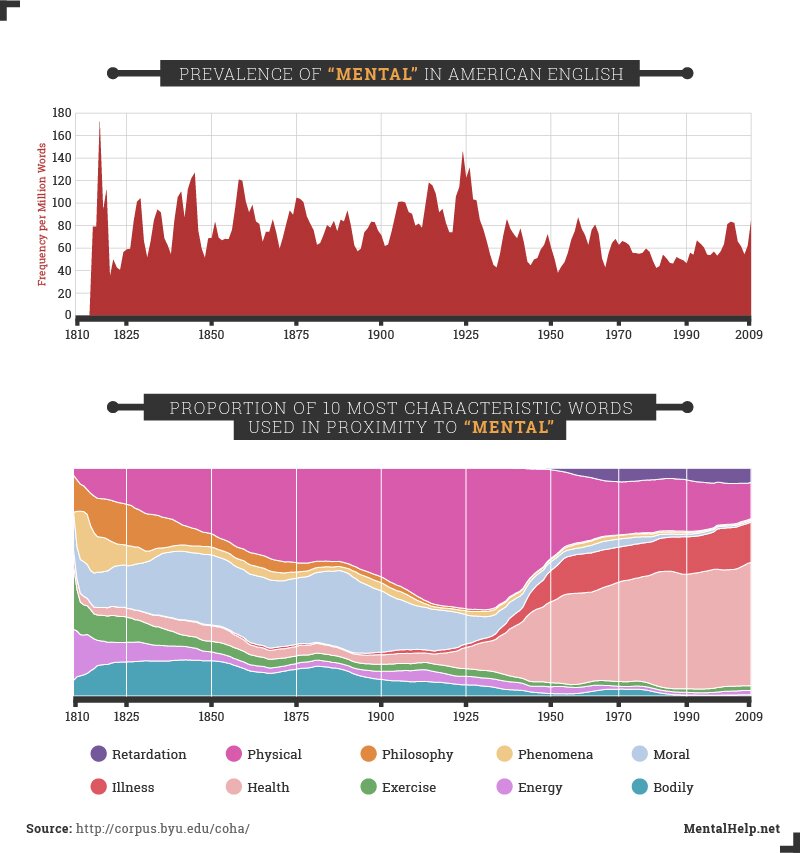
The use of the adjective mental to describe mental health or mental illness is a recent phenomenon that has come to dominate the use of this adjective over the past 60 years. Besides the pairing of mental and physical and the rise of the term mental retardation, the remaining pairings of these terms with mental have now mostly faded to obscurity: the academic-themed terms phenomena, philosophy, and moral, and the contrasting physical descriptors bodily, energy, and exercise.
11. Neurosis
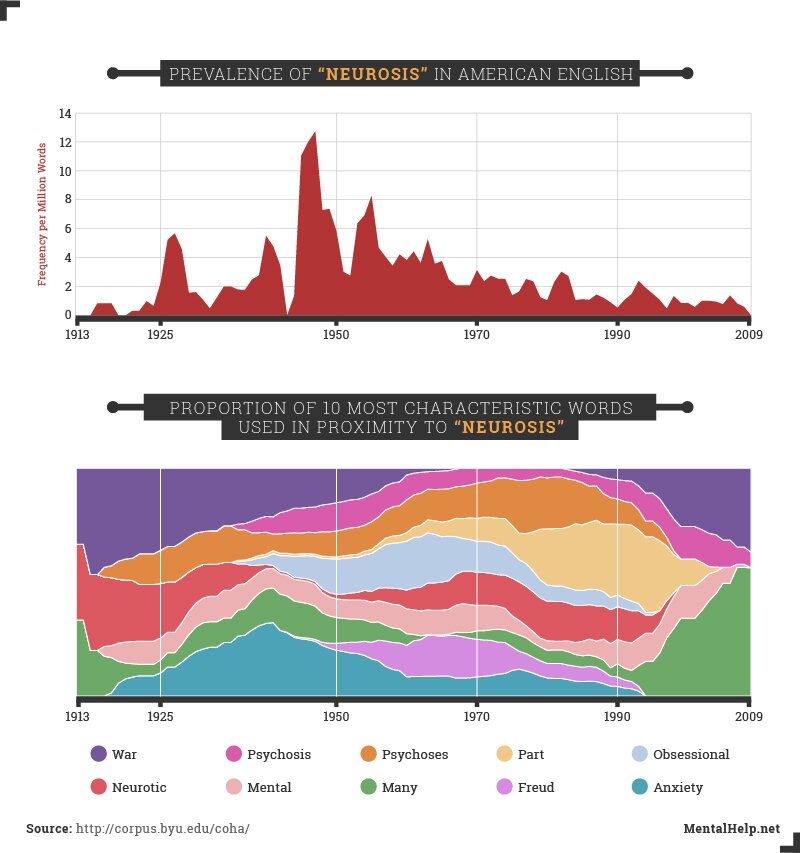
The term neurosis had its heyday in the 1950s, but modern usage has come to replace it with anxiety. At the turn of the 20th century, there was mostly talk of war neurosis (which would eventually be known as post-traumatic stress disorder or PTSD), and sufferers were often described as having many neuroses. Clinical terms such as mental, obsessional, psychosis, and the plural psychoses were mentioned in the same breath, as was Sigmund Freud. An interesting phenomenon occurred in the lead up to the 1990s, as phrases regarding certain anxieties being “part of one’s neuroses” or a neurosis being “part of a larger problem” emerged.
12. Phobia
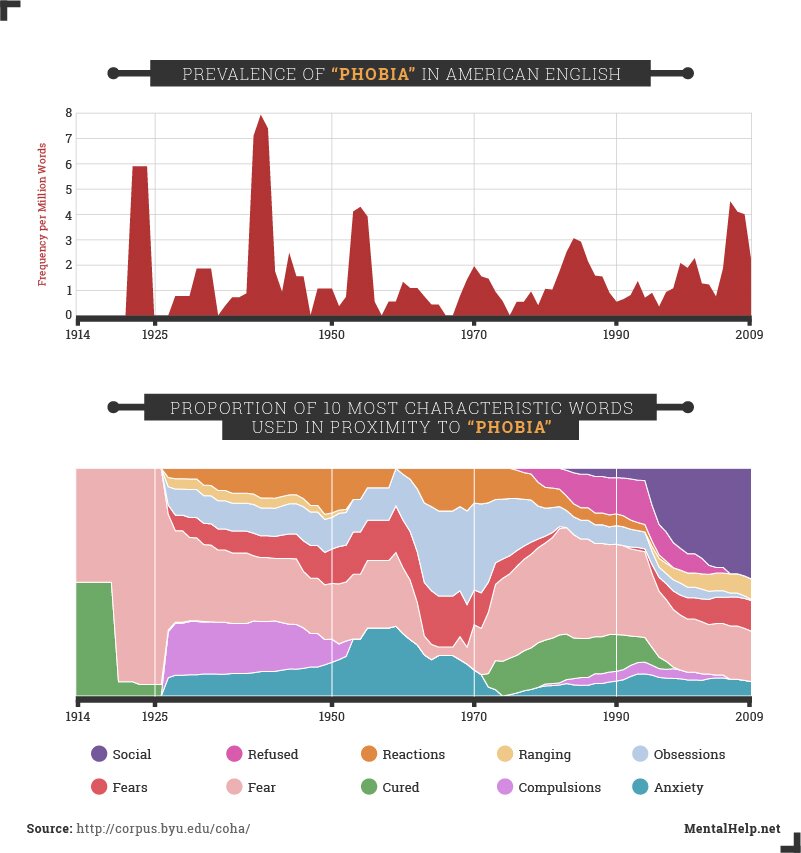
Phobia has been used alongside its synonyms fear and fears since the early 20th century. It quickly became associated with the more precise terms obsessions and compulsions as this word became better suited to people with obsessive-compulsive disorder (OCD) than to those experiencing the usual everyday fears.
There has been talk of phobias being cured and of phobias eliciting reactions ranging from one thing to another. Those with phobias have often refused to acknowledge their anxiety, and in the last few decades, social phobia has entered the lexicon as a term for intense struggles with social anxiety.
13. Psychiatric
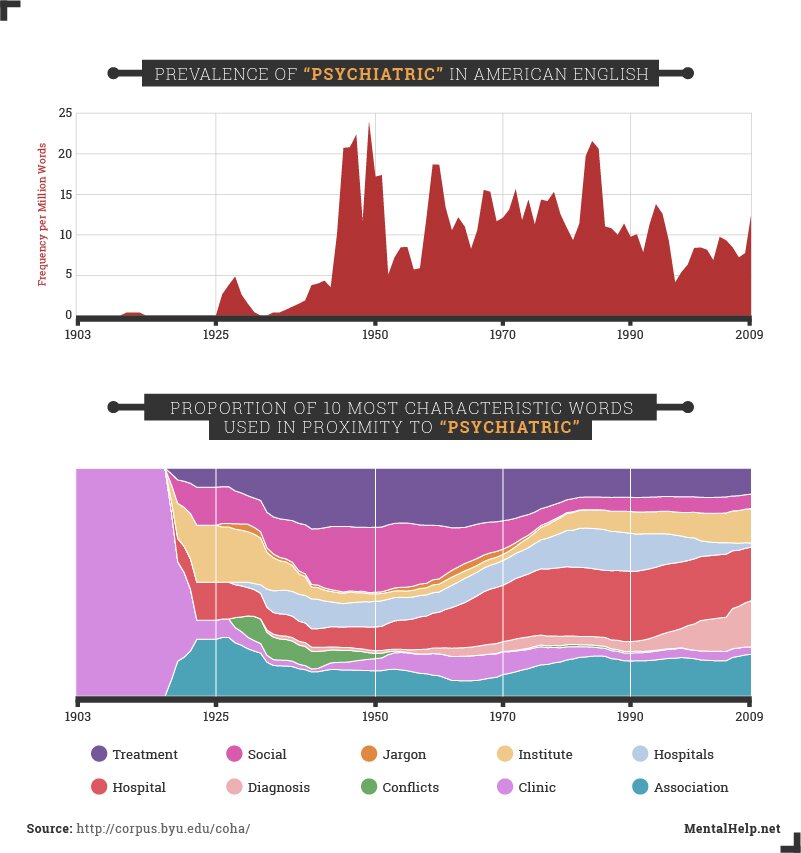
At the dawn of the Freudian age, only the psychiatric clinic was in the vocabulary, but quickly the psychiatric association, psychiatric hospital/hospitals, psychiatric institute, psychiatric diagnosis, psychiatric treatment, and psychiatric jargon joined the lexicon. Psychiatric patients were seen as having conflicts, and psychiatry was soon partnered with social care.
MentalHelp.net provide a number of resources for site visitors to help inform themselves of a variety of health issues, including articles detailing various treatment methods employed by both historical and modern psychiatry.
14. Psychology
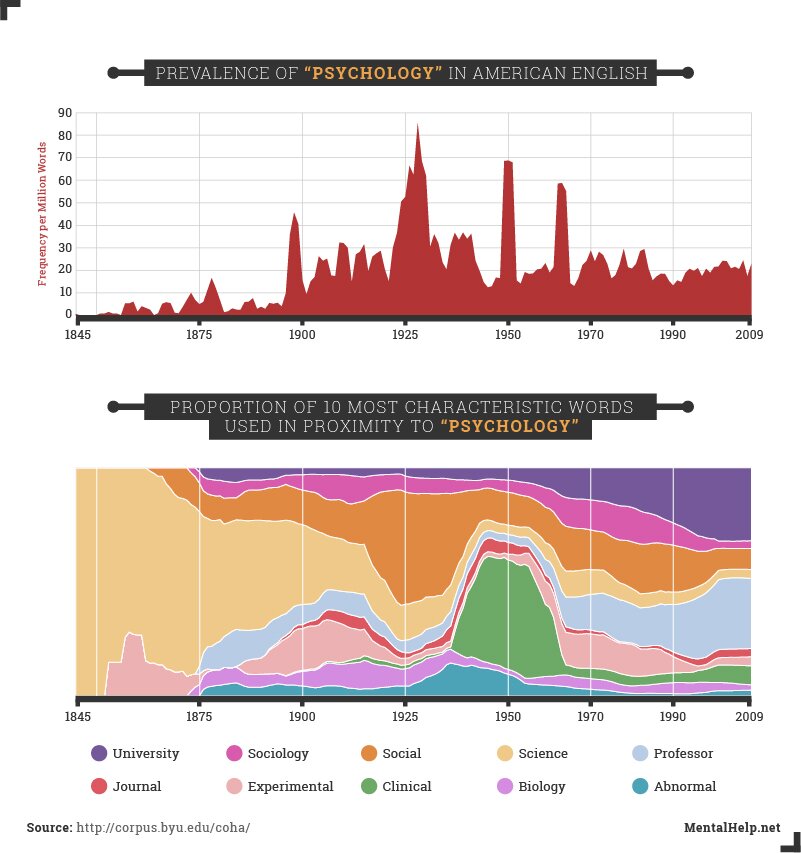 Now we come to several forms of the word psychology, beginning with the root word, which describes the science of the human mind and behavior. All the words surrounding psychology are clinical in nature: At first it had to be explicitly described as a science, but over time it came to be mentioned alongside other scientific terms such as biology, experimental, journal, professor, social, sociology, and university. A sub-discipline, abnormal psychology, also gained prominence.
Now we come to several forms of the word psychology, beginning with the root word, which describes the science of the human mind and behavior. All the words surrounding psychology are clinical in nature: At first it had to be explicitly described as a science, but over time it came to be mentioned alongside other scientific terms such as biology, experimental, journal, professor, social, sociology, and university. A sub-discipline, abnormal psychology, also gained prominence.
15. Psychological
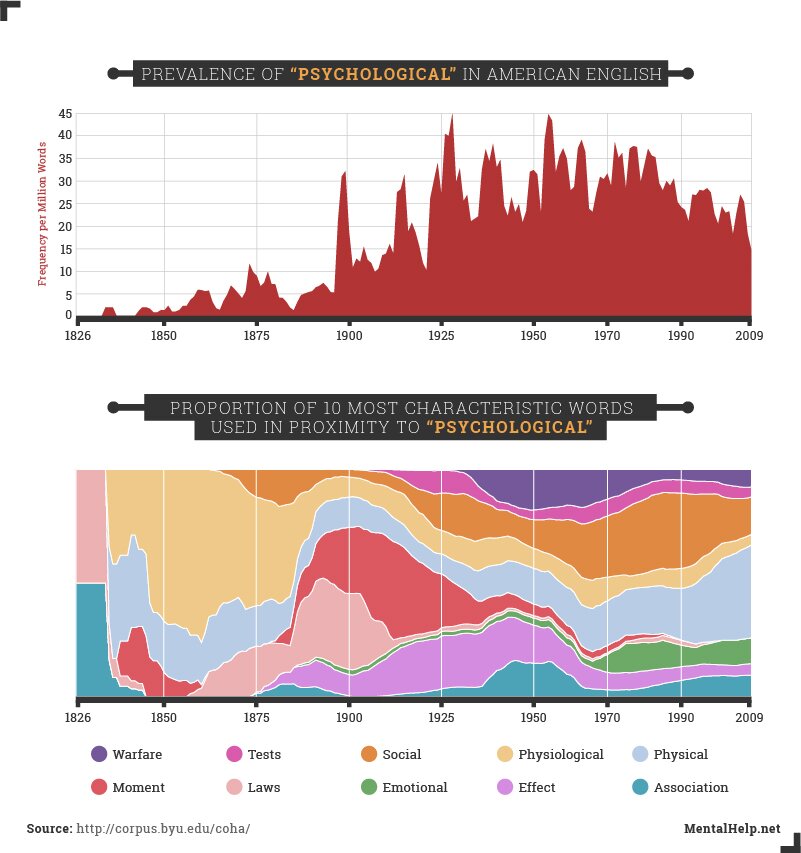
Switching the word psychology to its adjective psychological changes the surrounding words significantly. Psychological is mentioned alongside the physical, physiological, emotional, or social; things are seen to have a psychological effect; and there are psychological laws, psychological tests, and even psychological warfare. The psychological association was also on the rise, referring either to an association between ideas or between psychologists themselves. For a while, it was common to ask whether the time was right for an idea by questioning whether it was the appropriate psychological moment.
16. Psychologically
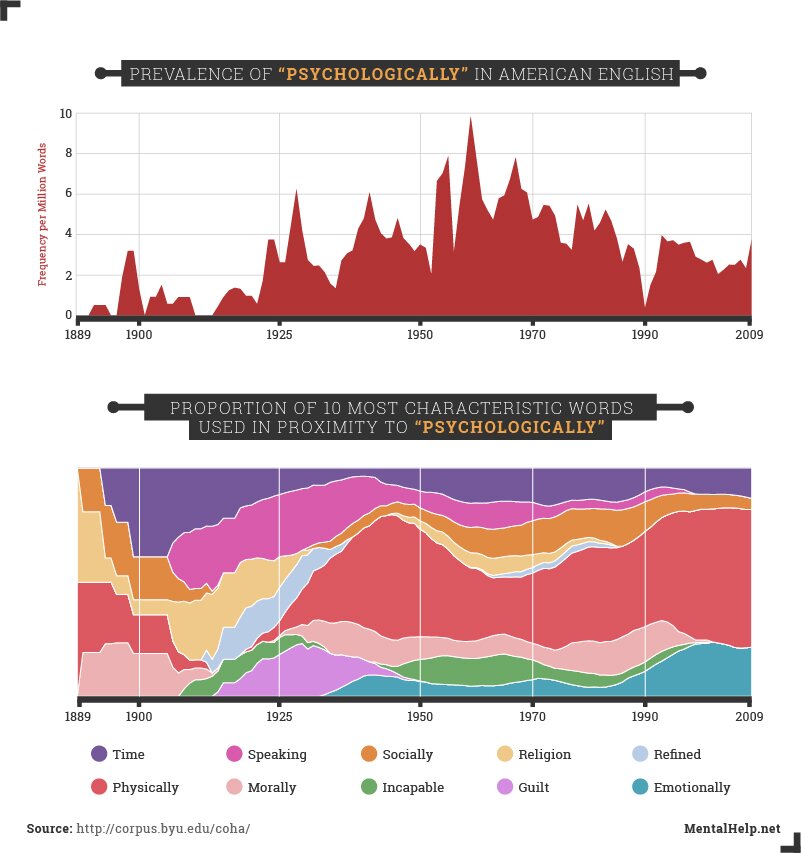
Some of the words that surrounded the adjective psychological were carried over to its adverb psychologically in their own adverb form, such as emotionally, morally, physically, and socially. However, the adverb now has certain adjectives and verbs that modify it, such as those found in the phrases “psychologically incapable,” “psychologically refined,” and “psychologically speaking.” Time is a word that seems to be associated by accident, as it is not used in any notable phrases. The impact of religion and guilt are also associated with their effects, psychologically.
17. Psychologist
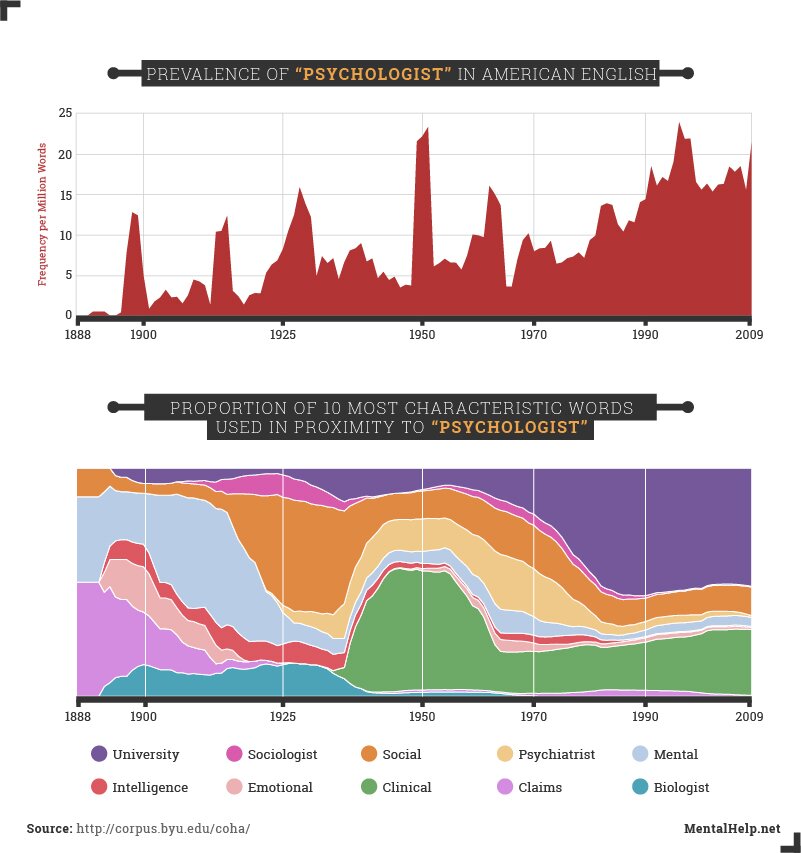
When we examine mental health practitioners themselves, the term psychologist takes on an academic context much like psychology. It’s associated with biologist, clinical, emotional intelligence, mental, psychiatrist, social, sociologist, and university, which each undoubtedly gave credence to a psychologist’s claims.
18. Psychologists
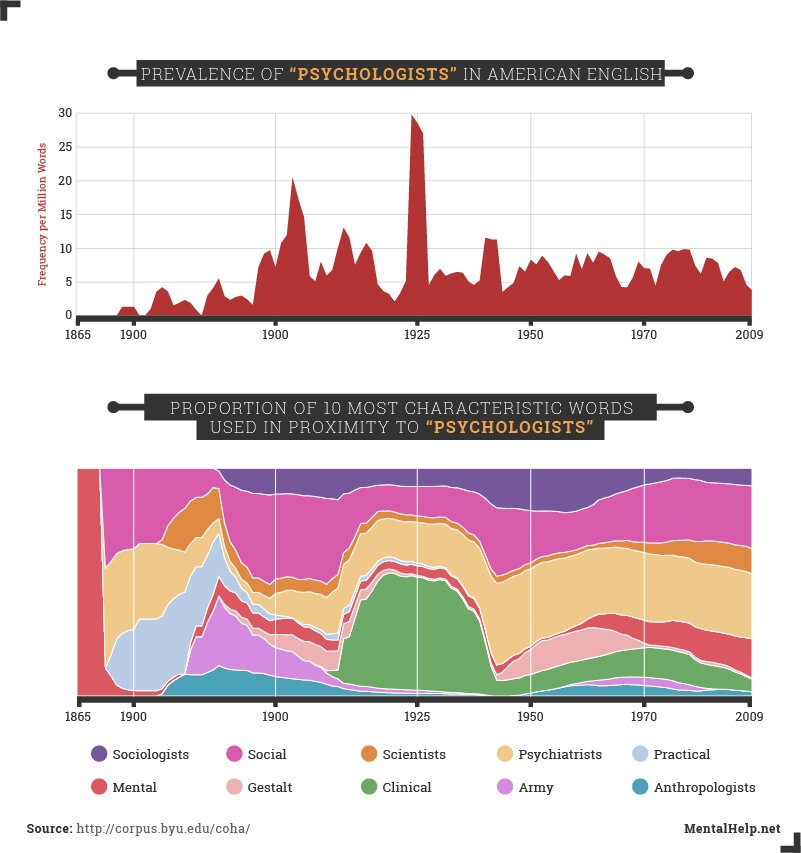 A change as small as pluralizing the previous term to psychologists has an outsized influence on many of the surrounding words. Clinical, mental, psychiatrists, social, and sociologists remain, but the more general term scientists is added, as is anthropologists and the specializations of army psychologists and gestalt psychologists. In the early days of the profession, many other people working in jobs that required knowledge of human nature and behavior, such as salespeople, were described as practical psychologists.
A change as small as pluralizing the previous term to psychologists has an outsized influence on many of the surrounding words. Clinical, mental, psychiatrists, social, and sociologists remain, but the more general term scientists is added, as is anthropologists and the specializations of army psychologists and gestalt psychologists. In the early days of the profession, many other people working in jobs that required knowledge of human nature and behavior, such as salespeople, were described as practical psychologists.
19. Schizophrenia
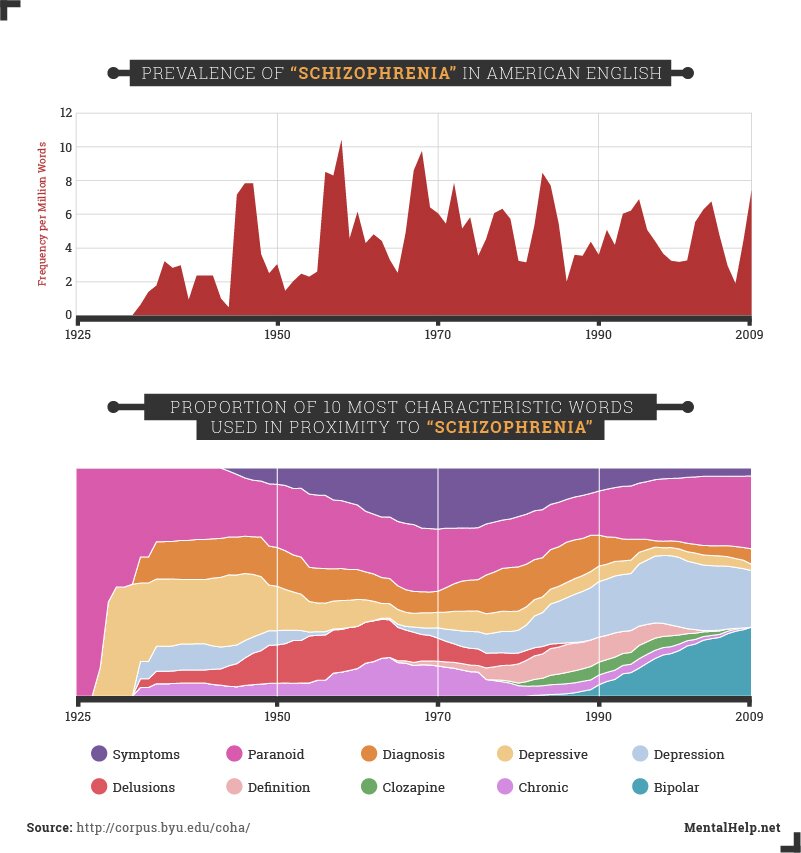
Schizophrenia entered the lexicon after World War I, at first known only as paranoid schizophrenia. Its diagnosis then became linked with depressions and the related depressive as well as the terms delusions and chronic. Clozapine came into widespread use in the 1980s as a term for a medication used to treat schizophrenia, and as its symptoms became better known, efforts were made to pin down a definition of schizophrenia and differentiate it from bipolar disorder.
The topic of schizophrenia—including its diagnosis and treatment—is one of many mental health topics addressed in detail on MentalHelp.net. We invite you to take a closer look at this and any other featured topics and site tools that might help you stay informed about as well as make important decisions regarding your health.
20. Stress
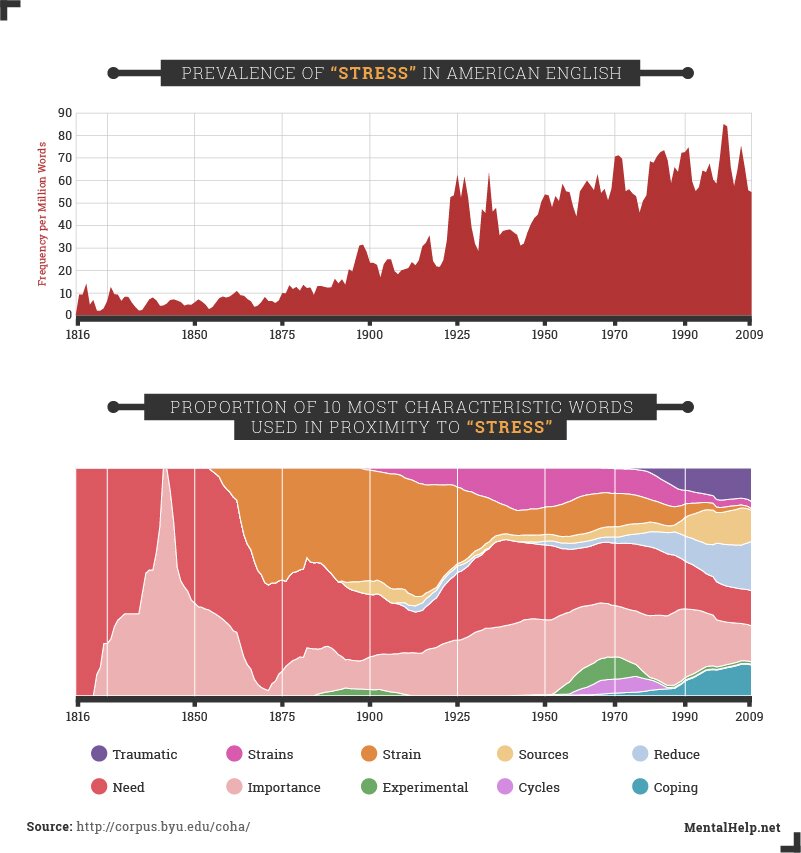 In the early 19th century, stress was used as a synonym for emphasize, associated with importance and used to stress the need for something. Stress as a physical and mental phenomenon appeared with the expression “stress and strain” (or strains) in the mid-1800s. At first the sources associated with the word were newspaper sources stressing certain points. But by the 20th century, “sources of stress” became a common phrase, as did coping with stress, cycles of stress, experimental stress analysis, and the need to reduce stress – particularly traumatic stress.
In the early 19th century, stress was used as a synonym for emphasize, associated with importance and used to stress the need for something. Stress as a physical and mental phenomenon appeared with the expression “stress and strain” (or strains) in the mid-1800s. At first the sources associated with the word were newspaper sources stressing certain points. But by the 20th century, “sources of stress” became a common phrase, as did coping with stress, cycles of stress, experimental stress analysis, and the need to reduce stress – particularly traumatic stress.
21. Therapy
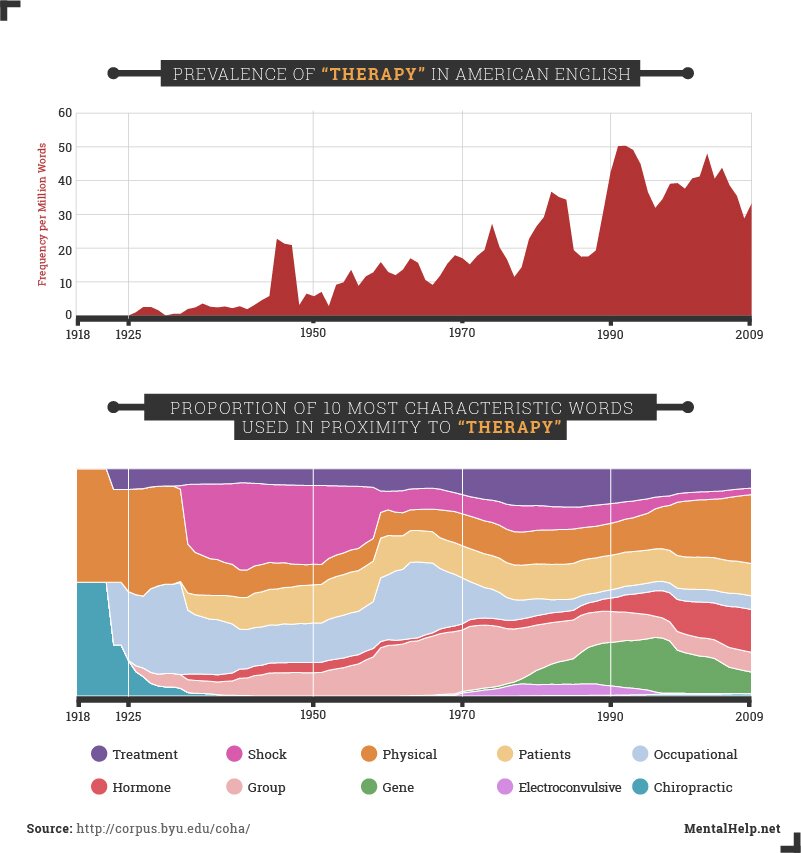
Therapy is used to describe the treatment of many kinds of health problems other than those related to mental health conditions: chiropractic, gene, hormone, occupational, and physical therapy appear in the literature. One of the earliest procedures to treat patients with mental illnesses was shock therapy, which later came to be known as electroconvulsive therapy. A less extreme therapy related to mental health is group therapy.
Understanding Mental Health Conditions
Our understanding of and available methods of treatment for mental and behavioral health issues have progressed substantially since the days when terms such as “hysteria” and “neurosis” were more heavily circulated. MentalHelp.net strives to provide current and comprehensive informational resources for a variety of mental health issues including mood disorders, anxiety disorders and schizophrenia. MentalHelp.net additionally maintains treatment center directories for recovery programs that address substance use disorders, behavioral addictions and dual diagnosis conditions. If you have questions about mental or behavioral health that you’d like to investigate further, MentalHelp.net urges you to visit the site to learn more about these and a number of other featured topics.
Sources
http://corpus.byu.edu/coha/
Methodology
The Corpus of Historical American English (COHA) at Brigham Young University is a curated collection of 115,000 textual sources, spanning fiction, magazines, newspapers, academic journals, and spoken transcripts from 1810 to 2009. After selecting these 21 search terms, we visualized their usage over time as a proportion of all words used in a given decade, smoothing with a rolling average window of one year.
We also collected the 10 words before and after each instance of the term in the corpus. We filtered out words occurring in only one document, which served to exclude many names and other proper nouns. Log-likelihood keyness was then used to determine which words were more likely to appear near a given search term, such as anxiety, than near any other word. The top 10 such words were selected and graphed as stream charts, showing how commonly each of the 10 words appears relative to the rest of the characteristic neighboring words. The stream charts were smoothed with a rolling average window of five years. These stream charts do not always span the entirety of 1810–2009, and in years where a term was too infrequent to appear, it was often used in proximity to words which were too common to include.
Fair Use
Feel free to share the images and research found on this page freely. When doing so, we ask that you kindly attribute the creators by providing your readers with a link back to this page so they may read more about the project and any related research.





















